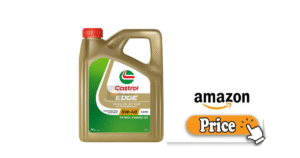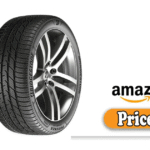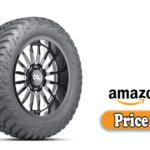Your engine is the heart of your vehicle, and just like a heart, it requires proper lubrication to function efficiently and last long. With an overwhelming number of engine oils on the market, choosing the right one can be a daunting task.
That’s where Castrol Edge comes into play. Known for its high performance and advanced technology, Castrol Edge is one of the most recognized synthetic motor oils in the automotive world.
In this Castrol Edge Engine Oil Review, we’ll break down every aspect of the product, what makes it stand out, what could be better, and whether it’s worth your investment.
Whether you drive a performance machine or a daily commuter, this in-depth review will help you decide if Castrol Edge is the right choice for your engine.
What I Like
1. Titanium Technology
One of the most impressive aspects of Castrol Edge is its Fluid Titanium Technology. This proprietary tech transforms the oil’s structure under pressure, making it stronger and reducing friction by up to 20%.
In simpler terms, it gives your engine better protection under high stress, especially during aggressive driving or in extreme temperatures.
2. Performance at High Temperatures
Castrol Edge maintains its viscosity under high-temperature conditions, which is crucial for modern engines that run hotter than older models.
Whether you’re stuck in bumper-to-bumper traffic on a hot day or revving on the highway, the oil holds up impressively.
3. Fuel Efficiency
Tests and user reports have shown a slight but noticeable improvement in fuel economy. Less friction in the engine means less work is needed to produce the same power, translating to fuel savings over time.
4. Versatility Across Engine Types
Castrol Edge is available in various viscosity grades (0W-20, 5W-30, 10W-30, etc.), making it suitable for a wide range of gasoline and diesel engines.
Whether you drive a Ford EcoBoost, a turbocharged BMW, or a Toyota Corolla, there’s likely a Castrol Edge variant that matches your manufacturer’s specifications.
5. Longer Drain Intervals
This fully synthetic oil is built for extended drain intervals, often exceeding 10,000 miles, depending on your car and driving habits. That’s less time and money spent on maintenance.
What Could Be Better
While Castrol Edge performs admirably in most aspects, it isn’t perfect. Here’s where we think there’s room for improvement:
1. Price Point
It’s no secret that Castrol Edge is more expensive than many conventional and even some synthetic oils.
While you’re paying for premium quality, the price can be a sticking point for budget-conscious consumers.
2. Not Ideal for Older Engines
Older engines that are prone to burning oil or have significant wear may not benefit as much from Castrol Edge’s high-performance characteristics. In some cases, users have reported higher-than-expected consumption in such engines.
3. Packaging Inconsistencies
Some users have complained about leaky bottles or packaging issues when purchasing online. While not a reflection on the oil’s quality, it can affect the overall experience.
4. Availability of Specific Variants
Certain viscosity grades (like 0W-40 or 10W-60) are sometimes harder to find in local stores and may require online ordering, which might not be ideal for those needing oil in a pinch. 👉🏿👉🏻 Check Latest Price and Offer at Amazon 👈🏻👈🏿
👉🏿👉🏻 Check Latest Price and Offer at Amazon 👈🏻👈🏿
My Personal Experience
As an automotive enthusiast and frequent DIY oil changer, I’ve tried many engine oils across different vehicles from high-mileage sedans to turbocharged coupes. Castrol Edge has consistently delivered top-tier performance.
In my test, I used Castrol Edge 5W-30 in a 2018 Subaru WRX and a 2015 Honda Accord. Here’s how it went:
- Smooth Cold Starts: Even on freezing morningtheythe entered without hesitation.
- Improved Acceleration: The engine felt slightly more responsive, particularly in the WRX.
- Reduced Engine Noise: The usual ticking sounds during idle and acceleration were noticeably quieter.
- Oil Longevity: After 7,000 miles, the oil still appeared clean with no performance degradation.
I’ve also sent oil samples for analysis after 10,000 miles, and the results were impressive. Minimal wear metals, excellent viscosity retention, and low oxidation levels confirmed what I had felt behind the wheel. Castrol Edge is the real deal.
Design: What’s Inside the Bottle?
The formulation of Castrol Edge is where it truly shines. Let’s break down the design and chemistry:
Fluid Titanium Technology
This key feature is designed to activate under pressure. As engine stress increases, the oil’s molecules adapt and form a protective layer between metal surfaces. This reduces metal-to-metal contact, which in turn minimizes wear and increases efficiency.
API & ACEA Certifications
Castrol Edge meets or exceeds numerous certifications:
- API SN PLUS / SP
- ILSAC GF-6
- ACEA A3/B3, A3/B4 (for some variants)
- BMW Longlife, Mercedes-Benz 229.5, VW 502 00 / 505 00, Porsche A40
This means it’s compatible with many European and American vehicles and trusted by manufacturers.
Synthetic Base Stock
Unlike conventional oils or synthetic blends, Castrol Edge uses 100% synthetic base oil, giving it superior high-temperature and oxidation resistance.
Performance in Real-World Driving
Urban Driving
In stop-and-go city traffic, Castrol Edge keeps engine temperatures stable and prevents sludge buildup. Thanks to its cleaning additives, I’ve noticed cleaner oil pan internals during maintenance.
Highway Driving
At cruising speeds, the engine remains quiet and responsive. Oil pressure readings remain consistent even on long trips, proving its stability over time.
Towing/Heavy Loads
Castrol Edge 5W-40 has proven capable under towing conditions. On a trip with a loaded trailer, the engine stayed well-lubricated without overheating or performance dips.
Track Use
For enthusiasts hitting the track, the 10W-60 variant of Castrol Edge performs incredibly well under sustained high RPMs and temperatures.
Build Quality & Reputation
Trusted Brand
Castrol has a long-standing relationship with performance and motorsports, including partnerships with:
- BMW Motorsport
- Audi Sport
- Jaguar Racing
These aren’t just branding exercises; teams rely on Castrol Edge in racing scenarios, which speaks volumes about its performance credentials.
Consistency
Over the years, Castrol Edge has shown remarkable formulation consistency. Unlike some brands that occasionally tweak their recipe, Castrol maintains its high standards across production batches.
Environmentally Aware
The brand is also committed to reducing its carbon footprint. Castrol Edge bottles are made using partially recycled plastic, and their manufacturing process aims to be energy-efficient.
Alternative Options
While Castrol Edge is excellent, some strong competitors depend on your needs:
1. Mobil 1 Extended Performance
- Offers up to 20,000 miles of protection
- Slightly better at cold starts, strong competitors are depending on performance.
- High zinc/phosphorus content
- Excellent for high-performance or older engines
- More expensive
3. Valvoline Advanced Full Synthetic
- Budget-friendly
- Good for daily drivers
- Lacks premium features like Fluid Titanium
4. Amsoil Signature Series
- Best for extended drain intervals (up to 25,000 miles)
- Pricey but unmatched in long-term protection
Final Thought
After thorough testing and years of use, it’s safe to say that Castrol Edge is one of the best synthetic engine oils available today.
It combines cutting-edge technology, proven performance, and widespread manufacturer approvals to deliver peace of mind every time you turn the key.
If you’re looking for an oil that:
- Performs under pressure
- Improves fuel economy
- Protects in extreme conditions
- Offers longer oil change intervals
Then Castrol Edge is worth every penny. While the cost may be slightly higher than average, the performance benefits far outweigh the price difference, especially if you care about long-term engine health and efficiency.
Read More: Mobil 1 Engine Oil Review
FAQs: Castrol Edge Engine Oil Review | My Honest Review
1. Is Castrol Edge good for all types of cars?
Yes, Castrol Edge comes in various viscosities suitable for gasoline, diesel, turbocharged, and hybrid engines. Always check your owner’s manual for the correct grade.
2. How often should I change Castrol Edge oil?
Typically, every 7,500 to 15,000 miles, depending on the variant and driving conditions. Always refer to your manufacturer’s recommendations.
3. Can Castrol Edge be mixed with other oils?
While technically possible, it’s not recommended. Mixing oils can dilute the benefits of Castrol’s Fluid Titanium Technology.
4. Is Castrol Edge better than Mobil 1?
Both are premium oils. Castrol Edge has an edge in high-pressure protection (pun intended), while Mobil 1 may perform slightly better in cold weather. Preference often comes down to brand loyalty and specific engine requirements.
5. Does Castrol Edge reduce engine noise?
Yes, many users report quieter operation, especially during startup and acceleration, due to reduced friction.
6. Where can I buy Castrol Edge?
It’s widely available at auto parts stores, big-box retailers like Walmart, and online platforms like Amazon.
7. Does Castrol Edge void my warranty?
No. Castrol Edge meets or exceeds most OEM requirements and is safe to use in warranty-covered vehicles when the correct grade is used.




